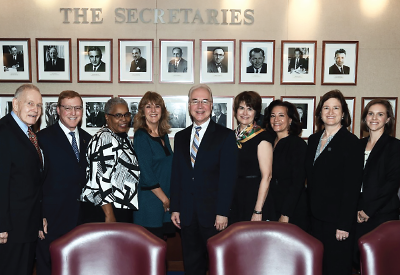Addiction Groups Bring Urgent Message to HHS Sec’y Price
Abstract
APA joins with other organizations in offering their expertise to HHS to battle the opioid epidemic.
APA was among the organizations that met in June with Health and Human Services Secretary Tom Price in Washington, D.C., to address the great need in this country for more addiction specialists and bring an end to the opioid epidemic.

Attending the meeting with Health and Human Services Secretary Tom Price were (from left) John Renner, M.D., president of the American Academy of Addiction Psychiatry (AAAP); Saul Levin, M.D., M.P.A., CEO and medical director of APA; Altha Stewart, M.D., president-elect of APA; Kathryn Castes-Wessel, CEO of AAAP; Price; Margaret Kotz, D.O., past president of the American Osteopathic Academy of Addiction Medicine (AOAAM); Nina Albano Vidner, executive director of AOAAM; Kelly Clark, M.D., M.B.A., president of the American Society for Addiction Medicine (ASAM); and Susan E. Awad, director of ASAM advocacy and government relations.
The other organizations were the American Academy of Addiction Psychiatry, the American Osteopathic Association of Addiction Medicine, and the American Society of Addiction Medicine. APA was represented by President-Elect Altha Stewart, M.D., and APA CEO and Medical Director Saul Levin, M.D., M.P.A.
The four organizations are authorized under the Drug Addiction Treatment Act of 2000 (DATA 2000) to provide medication assisted treatment training courses to physicians to enable them to apply for a waiver to prescribe buprenorphine for the treatment of opioid use disorder in office-based settings. As partners in the Providers’ Clinical Support System for Medication Assisted Treatment (PCSS-MAT) and Providers’ Clinical Support System for Opioid Therapies (PCSS-O), supported by the Substance Abuse and Mental Health Services Administration, the organizations have provided more than 400 courses and trained more than 100,000 health professionals.
The DATA 2000 organizations presented a united front during the roundtable with Price and urged HHS to take several actions that would have a meaningful impact in addressing this public health matter. Among them:
Maintain basic coverage for substance use disorders (SUDs) and mental health/behavioral health treatment services that include access to the full range of evidence-based services, especially medication-assisted treatment for all SUDs, including opioid use disorder.
Direct Federally Qualified Health Centers to have a minimum of two providers in each facility with a waiver to prescribe buprenorphine and the competence to provide basic outpatient services for patients with opioid use disorder.
Implement a naloxone overdose rescue program allowing all relevant federal agencies to purchase naloxone and buprenorphine at a reasonable cost.
Expand research on opioid use disorder to study long-term efficacy of the three FDA-approved medications used to treat opioid use disorder (buprenorphine, XR-naltrexone, methadone), patients best suited for detox versus long-term treatment with medications, and short-term treatment versus long-term maintenance treatment.
Build critical capacity of trained clinicians by expanding addiction psychiatry and addiction medicine fellowships and increasing addiction training in medical schools.
Make certain that individuals involved in the justice system (criminal, civil, family, and juvenile) have access to evidence-based mental health and drug treatment services within the justice system.
“APA stands ready, along with these other organizations, to work with Secretary Price and HHS staff to address this public health crisis,” Levin said in a later interview.
He added that all four groups expressed strong support for quick Senate confirmation of Elinore McCance-Katz, M.D., Ph.D., as the first Assistant Secretary for Mental Health and Substance Use in HHS. ■
PCSS training webinars can be accessed on APA’s website.



